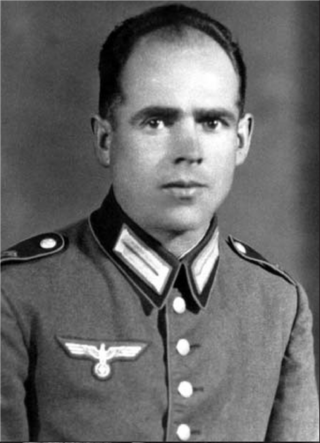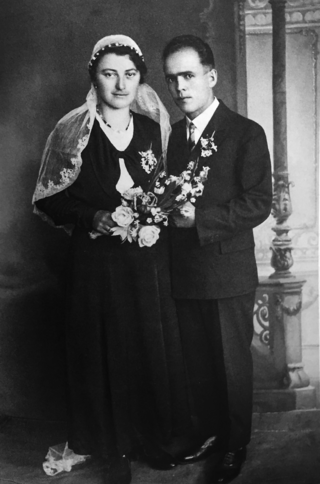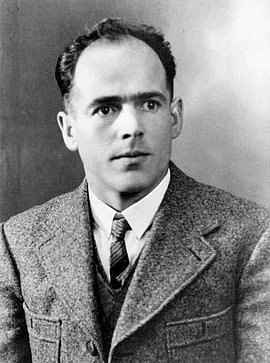Seliger Franz Jägerstätter (geb. Huber) OFS

Personalia
Born:
Died:
Profession:
Persecution:
Imprisoned 02.03.1943 - 09.08.1943,
Murdered on 09.08.1943
Curriculum Vitae
Franz Jägerstätter was born and grew up as an illegitimate child in his mother's home at Adamsölde, Hadermark 22. His biological father was Franz Bachmeier (killed in action in Walawa near Przemyśl on October 25, 1914), his mother Rosalia Huber. As his mother was unmarried when he was born, he was called Franz Huber for the first ten years of his life. His parents were poor and unable to marry or raise a child, which is why Franz stayed with his maternal grandmother Elisabeth Huber until 1916, when he moved to his fallen father's farm, to his grandparents Bachmeier. On February 19, 1917, his mother married Heinrich Jägerstätter, a farmer in St. Radegund, who adopted Franz, who therefore bore the name Franz Jägerstätter from then on.
Franz Jägerstätter worked briefly on a farm in Teising in the summer of 1927, then as a miner in Eisenerz until 1930. He uses the money he earns to buy a Puch motorcycle (250 series), which causes a sensation because it is the first motorcycle registered in St. Radegund. When his stepfather Heinrich Jägerstätter, who had no children of his own, died in 1933, Franz inherited the farm. A few months later, Theresia Auer, a maid on the Jägerstätter farm, gives birth to a girl who is baptized Hildegard. Franz Jägerstätter claims to be the father of the illegitimate child.
After the occupation of Austria by the German Reich on March 12, 1938, he refuses to accept the offer of the office of mayor. In the referendum on the reunification of Austria with the German Reich that followed on April 10, 1938, he was the only person in the town to vote "No". However, the electoral authorities concealed the vote against and reported 100 percent approval for the Anschluss.
His rejection of National Socialism was initially reflected in the fact that he increasingly withdrew from public life in his community, did not take advantage of benefits from the National Socialist German Workers' Party (NSDAP) and did not donate anything to the party, although he was otherwise very generous. In 1940, ten local residents, including Franz Jägerstätter, were denounced as opponents of National Socialism in a letter to the mayor; however, the mayor did not forward the letter to any authority.

This train is going to hell
.
On February 23, 1943, Franz Jägerstätter was drafted into the Wehrmacht in Enns, where he enlisted on March 1. After declaring his conscientious objection to military service, he was taken to the Wehrmacht remand prison in Linz on March 2. There he learned that other men were also refusing military service and resisting. On May 4, he is transferred to Berlin-Tegel. He refuses to recant his conscientious objection. His last doubts are dispelled when he learns from the prison chaplain Heinrich Kreutzberg that the Austrian fraternity student and Pallottine priest Franz Reinisch had also refused to do military service and had been executed for it.
I've always said that, I can't be on the wrong path, but if even a priest has made that decision and gone to his death for it, then I can do it too.
On July 6, 1943, the 2nd Senate of the Reich Court Martial (RKG) in Berlin-Charlottenburg, headed by Reich Court Martial Judge Werner Lueben, sentenced him to death for subversion of the armed forces. On July 14, 1943, the sentence was confirmed by Admiral Max Bastian, the master of the RKG. According to the RKG, Jägerstätter was prepared to perform medical service, but the court did not go into this. Franz Jägerstätter was taken to the Central Execution Site for Execution District IV in Brandenburg an der Havel Prison on August 9, 1943 and murdered by guillotine at 4 pm.
After the execution, his body was cremated in the Brandenburg crematorium on August 11, 1943. However, instead of following the instructions of the institution operators, according to which an anonymous burial is intended for those sentenced to death, the cemetery administration follows the general regulations for cremation and labels the urn with the name, date of birth, death and cremation and also adds the fireclay stone with the cremation number for clear identification. The urn is buried in the municipal cemetery, where Franciscan nuns plant flowers at the burial site after the cemetery administrator shows them the location.

On October 26, 2007, Franz Jägerstätter was beatified by Pope Benedict XVI.
Places
Residence:
Honoring:
Memorial:
Citations
- Wikipedia unter de.wikipedia.org/wiki/Franz_Jägerstätter
